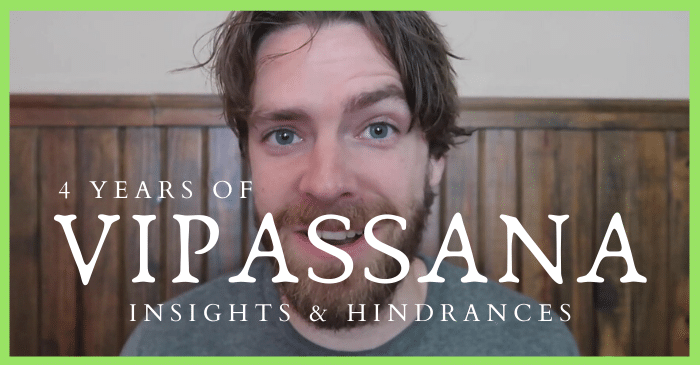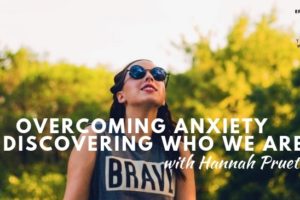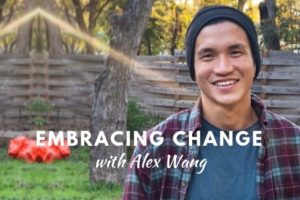These last four years, I’ve kept a daily meditation practice inspired by my first vipassana meditation course in 2016. Here, I’ll discuss my personal experience with the technique, some important hindrances to manage on your path, and more recently, how I’m overcoming these hindrances by opening up to new ways of thinking and being. I hope you find it useful and inspiring.
MY EXPERIENCE WITH VIPASSANA MEDITATION
In a search for happiness, I attended my first silent ten-day meditation retreat in January of 2016 (you can read the entire narrative here) where I experienced a mix of profound, revelatory and interesting states during the course (lucid dreaming, astral projection and deep levels of concentration). More importantly, I gained insight into the relationship between awareness, thoughts, and sensations.
My life prior to and after learning meditation felt like night and day. Realizing I was not my thoughts quite literally felt as if I had woken up for the first time. Suddenly, I now possessed a tool to disidentify from thought, to allow thoughts to arise without engaging or identifying with them. Simply to witness and love whatever arises. Slowly but surely, I felt myself coming to senses, grounding further into sensation, pure awareness and the present moment. Here, there existed a fullness, a deep love, and connection to source that was previously unavailable to me.
This first vipassana course changed my life so dramatically that I volunteered to serve the course immediately afterward, kept a near-religious daily meditation practice of two hours a day for the next three years, and returned to courses again and again to uncover and experience newer, deeper, subtler insights. I benefitted from discipline and consistency, and ultimately, became a gentler friend toward my own mind. My purpose became clear and my life had meaning. Much of my personal growth I attribute to the practice of meditation.
HINDRANCES
Alongside my various “awakening experiences” were various pitfalls and hindrances. Self-created impediments that kept me from experiencing unconditional love. It seems to me that so much of awakening is about removing these self-imposed blockages. Awareness of their existence hasn’t rid me of them, but it has helped me manage them effectively.
Here are some examples:
-
Proselytizing— I had a strong desire to spread the practice of meditation to others, oftentimes bringing up vipassana in conversation, subtly projecting my desires onto others, thinking they would be a better and happier person if they meditated.
-
Judgement— I began to judge others who didn’t meditate, especially those who meditated without the specific technique of vipassana.
-
Close-mindedness — I began to think that vipassana was the only path towards enlightenment. Those not practicing were wasting their time and efforts with other disciplines/techniques/etc.
- Ego — I began developing a noble and egoic image of myself as someone who meditates. I began counting courses and the number of hours that I meditated. I thought very highly of myself as “someone who meditates.”
-
Dogmatism — I noticed myself believing in second-hand knowledge rather than cultivating my own wisdom.
-
Results — I prioritized results over process, becoming over being. I believed that I wasn’t progressing unless I was experiencing something out of the ordinary. I craved interesting experiences. I separated becoming and being in my mind as two different concepts when there was actually no difference between the two.
- Panacea — I believed that through meditation alone, I could solve all my problems. That I would never have to implement and integrate my insights into the physical world.
THE PURSUIT OF ENLIGHTENMENT
I have by no means rid myself of these hindrances. There’s likely many others I remain unaware of, too. I ain’t perfect. I still experience suffering and neurotic patterns. There are so many layers to understanding and awakening that I have yet to peel back. Still, I’m grateful to report that when suffering arises (that is to say, identification with thought), the time spans between realization and coming to senses has decreased and continues to decrease, very subtly, with consistent practice.
Meditation hasn’t made me enlightened. Quite the opposite, actually. My meditation has shined a bright light on my own bullshit. I can now see more clearly where I’m getting in the way of myself, of love.
I once tried to rid myself of these hindrances, but now, instead of trying to fix, judge, bully or force change upon what arises, I practice becoming aware of them and loving them completely. Loving my imperfections and desires fully and developing compassion for the human experience. As cheesy as it sounds, the answer to my hindrances is practicing love. Becoming that space of loving-kindness and loving-compassion for whatever arises. To enjoy each moment as it is, instead of how I’d like it to be. And as I slowly remedy the hindrances that block me from the truth, change unfolds. Meditation helps me get out of the way of myself. To let go, let be, accept and love. While I do not always reside within this space, I at least have the tools and the ability to reach it. Everyone does, in fact. There is no special technique that lays claim as the sole authority of peace. It can be achieved in any moment.
I’ll end this with a caveat. This is my experience at this moment. If I’ve learned anything, it’s that things will change. Also, be wary of comparing your experience to mine. Yours might be completely different. Thanks and much love. If you’d like me to dive deeper into any specific topic (meditation, spirituality, etc.), please let me know in the comments.
FOLLOW THE JOURNEY
I hope you enjoyed the read. If you did, please share it with a close friend and consider following the journey:
Wishing you well.
Love,
David
PS — Thanks to my patrons who support my work.
PSS — You can purchase my hiking memoir, The Trail Provides, on Amazon and Audible today.





Leave a Reply
I guarantee 100% privacy. Your information will not be shared.